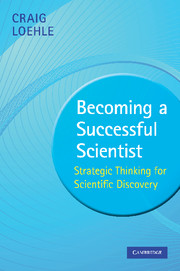4 - The social dimension of science
Published online by Cambridge University Press: 05 June 2012
Summary
Science is not merely conceptual, but instead involves active manipulation of the world to arrive at new knowledge. In this chapter, the implications of the ideas presented in the first chapters are explored. First, the process of developing and executing a scientific research program are explored, publishing papers is discussed, some ethical issues are touched on, and finally, the problem of interfacing science with the world of policy is addressed.
CONDUCTING A RESEARCH PROGRAM
Research that is random and aimless is unlikely to be very productive. In the age of naturalists, it was productive to collect specimens and observe animals in the wild because little or nothing was known. But today, any random observation is likely to be already known. Thus a key to success is to focus on a problem.
Earlier chapters discussed concepts that can help one to identify a problem worth working on. To review briefly: paradox can help one identify an opportunity; new tools and methods can open up topics to analysis; obtaining a larger data set or one at a larger scale than previous studies can lead to insights; and refining or testing a theory is always a productive avenue. Of course the idea of leverage as embodied in the Medawar zone can help one pick topics with a high payoff.
Given that a promising topic has been picked, the textbook view and the impression given to graduate students is that you should next design and conduct an experiment or study.
- Type
- Chapter
- Information
- Becoming a Successful ScientistStrategic Thinking for Scientific Discovery, pp. 208 - 237Publisher: Cambridge University PressPrint publication year: 2009



